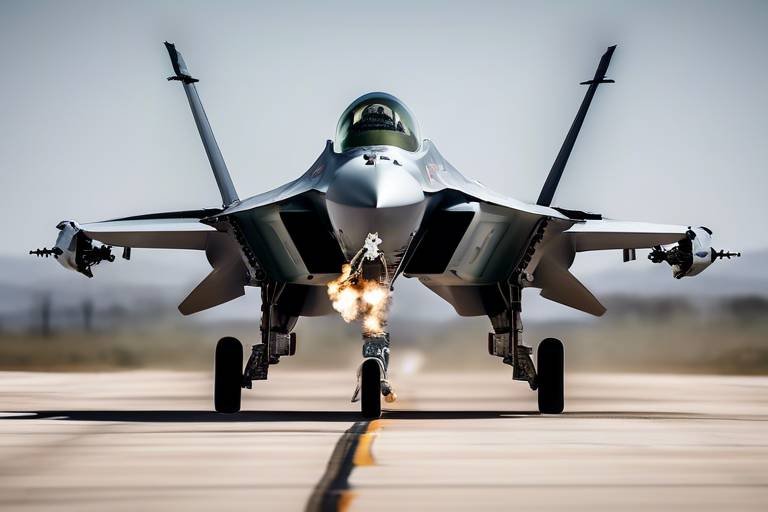The Future of Space-Based Defense Systems
The future of space-based defense systems is not just a topic of military interest; it’s a thrilling frontier that intertwines technology, strategy, and international relations. As we stand on the brink of a new era in defense, the implications of these systems stretch far beyond the realm of warfare. Imagine a world where satellites not only provide breathtaking views of our planet but also serve as vigilant guardians against potential threats. This is not science fiction; it’s becoming our reality. With the rapid evolution of technology, we are witnessing a transformation that could redefine how nations protect their interests and maintain stability.
Space-based defense systems are fundamentally about **protection** and **prevention**. They offer a unique vantage point that terrestrial systems simply cannot match. From monitoring missile launches to tracking space debris, the capabilities of these systems are expanding at an unprecedented pace. The integration of advanced technologies like artificial intelligence (AI) and machine learning is enabling real-time analysis and response to threats, making these systems not only reactive but also proactive. Think of it as having a watchful eye in the sky, one that can anticipate danger before it even arrives.
However, the evolution of space-based defense systems is not without its complexities. As nations ramp up their capabilities, the **strategic importance** of these systems becomes more pronounced. Countries are investing heavily in their space programs, recognizing that control of space is tantamount to control of security. In this context, space is the new frontier of military competition, and the stakes are incredibly high. The question is no longer if we should invest in space defense, but rather how we can do so effectively and responsibly.
As we delve deeper into this subject, we will explore the various facets that shape the future of space-based defense systems, from emerging technologies and global military investments to the legal and ethical considerations that accompany their deployment. The path forward is fraught with challenges, but the potential benefits are immense. It’s a journey that demands careful navigation, collaboration, and a commitment to ensuring that space remains a domain for peaceful exploration rather than conflict.
- What are space-based defense systems?
Space-based defense systems refer to military capabilities that operate in space, such as satellites used for surveillance, missile warning, and communication. - Why is space defense important?
Space defense is crucial for national security, as it enhances a country's ability to monitor threats and respond to potential attacks from space. - What challenges do space-based defense systems face?
Challenges include funding constraints, technological limitations, geopolitical tensions, and the need for international cooperation. - How do legal and ethical considerations impact space defense?
Legal and ethical considerations involve issues like the weaponization of space, sovereignty, and the potential escalation of conflicts among nations.

Emerging Technologies in Space Defense
In the ever-evolving realm of space defense, emerging technologies are not just enhancing capabilities; they are fundamentally reshaping how nations approach security in the cosmos. Recent innovations in satellite technology, propulsion systems, and artificial intelligence are at the forefront of this transformation, enabling nations to monitor and respond to potential threats with unprecedented efficiency.
One of the most exciting advancements is in satellite technology. Modern satellites are becoming increasingly sophisticated, equipped with high-resolution imaging, advanced sensors, and real-time data processing capabilities. This allows for enhanced surveillance that can detect hostile activities from thousands of miles away. Imagine a network of satellites working in harmony, continuously scanning the Earth for any unusual movements. This level of vigilance is crucial for national security, especially as threats become more diverse and complex.
Moreover, the development of propulsion systems is revolutionizing how we deploy and maneuver these satellites. Traditional rocket technologies are being complemented by innovative solutions like ion propulsion and solar sails, which offer greater efficiency and longer operational lifespans. With these advancements, satellites can be repositioned quickly in response to emerging threats, ensuring that nations maintain a strategic advantage in space.
Artificial intelligence (AI) is another game-changer in the space defense arena. AI algorithms can analyze vast amounts of data at lightning speed, identifying patterns and anomalies that might go unnoticed by human operators. This capability is essential for real-time threat assessment, allowing defense systems to react swiftly to potential dangers. For instance, AI can help in tracking missile launches or identifying rogue satellites, providing military leaders with actionable intelligence almost instantaneously.
To illustrate the impact of these technologies, consider the following table that outlines some of the key advancements and their implications:
| Technology | Description | Implications for Space Defense |
|---|---|---|
| Satellite Technology | High-resolution imaging and advanced sensors | Enhanced surveillance and monitoring capabilities |
| Propulsion Systems | Ion propulsion, solar sails | Increased maneuverability and operational efficiency |
| Artificial Intelligence | Data analysis and anomaly detection | Real-time threat assessment and rapid response |
As we look to the future, the integration of these technologies will undoubtedly lead to a new era of space defense, characterized by enhanced capabilities and a more proactive approach to security. However, it's essential to recognize that with these advancements come challenges, including the need for regulatory frameworks and international cooperation to ensure that space remains a domain of peace rather than conflict.
In conclusion, the landscape of space-based defense systems is changing rapidly, driven by innovative technologies that enhance our ability to protect national interests. As nations invest in these advancements, the implications for global security are profound, prompting a reevaluation of how we approach defense in an increasingly crowded and contested space environment.

Strategic Importance of Space Defense
In today's rapidly evolving geopolitical landscape, the cannot be overstated. As nations increasingly rely on advanced technologies for their security, space-based defense systems have emerged as a critical component in safeguarding national interests. These systems not only enhance surveillance capabilities but also bolster communication and missile defense strategies, providing countries with a significant edge over potential adversaries.
Imagine a chess game where every piece represents a nation’s military assets. In this game, the ability to control the board from above—through satellites and space-based systems—can dictate the outcome. Space defense allows for real-time monitoring of activities on Earth, enabling nations to anticipate threats and respond swiftly. This capability is particularly vital in an age where cyber warfare and missile technology have become increasingly sophisticated.
Moreover, the integration of space defense systems into national security strategies offers multifaceted advantages. For instance, these systems facilitate:
- Enhanced Surveillance: Satellites equipped with advanced imaging technology can monitor vast areas, providing vital intelligence that informs military and diplomatic decisions.
- Improved Communication: Reliable communication systems in space ensure that military forces remain connected, even in the most remote locations, allowing for coordinated responses to crises.
- Missile Defense Capabilities: Space-based interceptors can detect and engage incoming threats, providing a protective shield over key assets and populations.
As countries invest heavily in these technologies, the race for space dominance intensifies. This arms race is not merely about military might; it’s about national security, economic stability, and maintaining a competitive edge in a world where space has become a new frontier for warfare. The strategic importance of space defense extends beyond individual nations; it encompasses global security dynamics, as nations must navigate the complexities of alliances and rivalries in this high-stakes environment.
Furthermore, the implications of space defense systems stretch into the realm of deterrence. By demonstrating advanced capabilities, nations can dissuade potential aggressors from taking hostile actions. The mere presence of a robust space defense system can serve as a formidable deterrent, ensuring that nations think twice before escalating conflicts. In this context, the strategic importance of space defense becomes not only a matter of technology but also of psychology and diplomacy.
In conclusion, the strategic importance of space defense is multifaceted and profound. As we look to the future, it is clear that nations must prioritize the development and integration of space-based defense systems into their overall security frameworks. The ability to monitor, communicate, and defend from space will shape the security landscape for generations to come.

Global Military Investments
As we stand on the brink of a new era in military strategy, the significance of in space-based defense systems cannot be overstated. Countries around the world are recognizing that the future of warfare is not confined to terrestrial battlegrounds; rather, it extends into the vast expanse of space. With the rise of potential threats from both state and non-state actors, nations are ramping up their investments in technologies that can secure their interests beyond the atmosphere.
For instance, the United States has been leading the charge with its Space Force, which emphasizes the importance of space in national defense. This newly established branch is dedicated to protecting U.S. interests in space, including the development of satellite systems that can detect missile launches and potential threats from adversaries. The budget allocated for space defense has seen a dramatic increase, reflecting a broader trend where military expenditures are increasingly directed toward space capabilities.
In addition to the U.S., countries like China and Russia are also investing heavily in their space military programs. China has been rapidly advancing its satellite technology and has even demonstrated anti-satellite capabilities, which raises alarms in the international community. Russia, on the other hand, has been focusing on developing systems that can counteract U.S. missile defense strategies, indicating that the space race is not just about exploration, but also about securing military dominance.
To give you a clearer picture, here’s a table highlighting the military investments in space defense by some of the leading nations:
| Country | Investment in Space Defense (2023) | Key Programs |
|---|---|---|
| United States | $30 billion | Space Force, Missile Defense Agency |
| China | $25 billion | Satellite Navigation, Anti-Satellite Systems |
| Russia | $20 billion | Military Satellite Program, Space-based Radar |
| India | $10 billion | Indian Space Research Organisation (ISRO) Initiatives |
This growing trend of investment reflects a strategic shift in how nations perceive threats and opportunities in the realm of space. It's not just about having advanced technology; it's about having the capability to respond swiftly to any potential aggression in this new frontier. As countries enhance their surveillance capabilities and missile defense systems, the race for dominance in space is becoming a critical aspect of national security strategies.
Moreover, these investments are not limited to traditional military powers. Emerging nations are also entering the fray, seeking to bolster their capabilities and secure their interests in space. This has led to a more competitive environment, where alliances are formed, and rivalries intensify. The implications of these investments extend beyond mere military might; they encompass economic interests, technological advancements, and even diplomatic relations.
In conclusion, the landscape of global military investments in space defense is rapidly evolving. As nations continue to allocate substantial resources toward securing their interests in space, the future of warfare will undoubtedly be shaped by these developments. The question remains: will this race for space dominance lead to greater security, or will it escalate tensions among nations? Only time will tell.
- What are space-based defense systems? Space-based defense systems refer to military technologies and strategies that utilize space assets, such as satellites, to enhance national security and defense capabilities.
- Why are countries investing in space defense? Countries are investing in space defense to protect their national interests, respond to potential threats, and maintain a strategic advantage in an increasingly militarized space environment.
- What challenges do space-based defense systems face? Challenges include funding constraints, technological limitations, and geopolitical tensions that complicate international cooperation.
- How does public perception affect space defense initiatives? Public sentiment toward space defense can influence policymaking and funding, as advocacy for peaceful uses of space may lead to shifts in priorities and program development.

Public-Private Partnerships
In the ever-evolving landscape of space-based defense, have emerged as a pivotal force driving innovation and enhancing the capabilities of national defense systems. These collaborations between government agencies and private companies are not just beneficial; they are essential for keeping pace with the rapidly changing technological environment. Imagine a scenario where the government, with its vast resources and strategic objectives, teams up with nimble private enterprises that excel in cutting-edge technologies. This fusion creates a powerhouse of innovation, enabling the development of advanced systems that can effectively respond to both current and future threats.
One of the most exciting aspects of these partnerships is the ability to leverage the unique strengths of both sectors. Government entities bring stability, regulatory frameworks, and a long-term vision, while private companies contribute agility, creativity, and the latest technological advancements. For instance, companies specializing in artificial intelligence and satellite technology are collaborating with defense departments to create systems capable of real-time threat detection and analysis. This synergy not only accelerates the pace of technological advancement but also ensures that the solutions developed are practical and aligned with national security needs.
Moreover, these partnerships can significantly reduce costs and risks associated with developing new technologies. By sharing resources and expertise, both parties can mitigate the financial burden of extensive research and development. A notable example is the collaboration between NASA and SpaceX, which has revolutionized space transportation and opened up new avenues for defense applications. Such partnerships exemplify how the combination of public and private interests can lead to groundbreaking advancements in space defense.
However, the road to successful public-private partnerships is not without its challenges. Issues such as intellectual property rights, data security, and differing priorities can complicate collaborations. To navigate these complexities, establishing clear communication channels and mutual trust is crucial. Both parties must be on the same page regarding objectives, timelines, and expectations to ensure that the partnership yields fruitful results.
In conclusion, public-private partnerships are transforming the landscape of space-based defense systems. By fostering collaboration between government and private sectors, we can harness the power of innovation to enhance our national security. As we look to the future, it is imperative that these partnerships continue to evolve, adapting to new challenges and opportunities in the realm of space defense.
- What are public-private partnerships in space defense? Public-private partnerships in space defense refer to collaborations between government entities and private companies aimed at developing advanced technologies and systems for national security.
- Why are these partnerships important? They leverage the strengths of both sectors, accelerating innovation, reducing costs, and enhancing the capabilities of space-based defense systems.
- What challenges do public-private partnerships face? Challenges include intellectual property rights, data security, and aligning the differing priorities of public and private entities.
- Can you give an example of a successful partnership? A notable example is the collaboration between NASA and SpaceX, which has significantly advanced space transportation technologies.

International Cooperation
In an era where the cosmos is becoming a new frontier for national security, is not just beneficial; it is essential. The complexities of space-based defense systems require nations to work together, pooling resources, knowledge, and technology to address common threats. Imagine a world where countries act independently in space, each launching their own satellites and defense systems without any coordination. It would be chaotic, much like a traffic jam on a busy highway where every car is trying to go in different directions. Instead, by fostering collaboration, nations can create a more organized and effective defense strategy that enhances global security.
One of the key aspects of international cooperation in space defense is the establishment of multinational partnerships. Countries like the United States, European Union members, and Japan are already engaging in joint ventures to develop advanced satellite technologies and missile defense systems. These partnerships not only enhance technological capabilities but also build trust among nations. For instance, the European Space Agency (ESA) collaborates with NASA on various projects, sharing data and resources that ultimately strengthen both organizations' missions.
Moreover, the sharing of intelligence plays a crucial role in these collaborations. When nations share data about potential threats, such as missile launches or space debris, they can respond more effectively and swiftly. This type of cooperation can be likened to a neighborhood watch program, where everyone keeps an eye out for suspicious activities, ensuring the safety of the entire community. In the context of space, this means not just protecting national interests but also safeguarding the shared environment of outer space.
However, international cooperation is not without its challenges. Geopolitical tensions can complicate relationships, and nations may be hesitant to share sensitive information. The key lies in establishing trust and transparency. Countries must engage in open dialogues, participate in joint exercises, and create frameworks that encourage collaboration. For example, the United Nations Office for Outer Space Affairs (UNOOSA) plays a pivotal role in facilitating discussions and agreements among nations regarding the peaceful use of outer space.
In conclusion, as we navigate the complexities of space-based defense, international cooperation will be the linchpin for success. By working together, nations can not only enhance their own security but also contribute to a more stable and peaceful space environment. After all, in the vastness of space, unity is strength, and collaboration is the key to overcoming the challenges that lie ahead.
- Why is international cooperation important in space defense?
International cooperation is crucial because it allows nations to share resources, technology, and intelligence, making space defense systems more effective and promoting global security. - What are some examples of international partnerships in space defense?
Examples include collaborations between NASA and the European Space Agency (ESA), as well as joint military exercises involving multiple nations to enhance space surveillance capabilities. - What challenges do countries face in cooperating on space defense?
Challenges include geopolitical tensions, differing national interests, and concerns about sharing sensitive information that could compromise security. - How can nations build trust for effective cooperation?
Nations can build trust through transparent communication, joint training exercises, and establishing clear frameworks for collaboration that address each country's concerns.

Challenges Facing Space-Based Defense
The landscape of space-based defense is not without its hurdles. As we venture deeper into the cosmos, the challenges facing these systems become increasingly complex and multifaceted. One of the most pressing issues is funding constraints. Governments around the world are often faced with budgetary limitations that can stall or even halt the development of crucial technologies. Imagine trying to build a spaceship with only a fraction of the necessary resources—it’s a daunting task! This scarcity of funds can lead to delays in deployment and a reliance on outdated technology, which is a significant disadvantage in a field that evolves at lightning speed.
Another challenge is technological limitations. While we have made great strides in satellite technology and artificial intelligence, there are still significant gaps that need to be addressed. For instance, the ability to accurately detect and respond to threats in real-time is still an area requiring substantial improvement. The complexity of space environments means that systems must be incredibly resilient and adaptable. If you think about it, space is like a vast ocean—navigating it requires not just advanced ships (or satellites) but also precise maps and weather forecasts (or data analytics) to avoid potential dangers.
Moreover, geopolitical tensions present another layer of difficulty. As nations ramp up their space defense capabilities, the risk of misunderstandings and conflicts increases. Countries may perceive each other's advancements as threats, leading to an arms race in space that could spiral out of control. This situation is akin to a game of chess, where every move is scrutinized, and the stakes are incredibly high. The potential for miscommunication can result in escalated tensions, making international cooperation essential yet challenging.
To navigate these challenges effectively, nations must prioritize collaboration and transparency. Establishing a framework for sharing information and best practices can help mitigate the risks associated with geopolitical tensions. Furthermore, investing in research and development can lead to breakthroughs that address both funding and technological limitations. The future of space-based defense hinges on our ability to adapt and innovate in the face of these formidable challenges.
- What are the main challenges facing space-based defense systems?
The key challenges include funding constraints, technological limitations, and geopolitical tensions, all of which can hinder the effectiveness and development of these systems.
- How do funding constraints impact space defense programs?
Limited budgets can lead to delays in technology deployment and a reliance on outdated systems, making it difficult to keep pace with rapid advancements in the field.
- Why is international cooperation important in space defense?
Cooperation helps to mitigate geopolitical tensions and promotes transparency, which is essential for ensuring that advancements in space defense do not lead to misunderstandings or conflicts.

Legal and Ethical Considerations
The deployment of space-based defense systems is not just a matter of technology and strategy; it delves deeply into the realms of legal and ethical considerations that are essential for maintaining peace and security in the cosmos. As nations race to establish their presence in space, the potential for conflict escalates, raising pressing questions about the weaponization of space, the rights of nations, and the implications for global stability.
One of the primary concerns is the weaponization of space. With countries developing advanced military capabilities that extend beyond Earth’s atmosphere, the risk of space becoming a battleground is real. This notion contradicts the foundational principles established in the Outer Space Treaty of 1967, which emphasizes that space should be used for peaceful purposes. However, as technology advances, the definition of "peaceful" is becoming increasingly blurred. Are missile defense systems stationed in orbit a form of protection or a prelude to conflict? This is a question that requires careful consideration.
Additionally, the issue of sovereignty comes into play. Each nation has its own interests and objectives, leading to a complex web of interactions that can easily turn hostile. For instance, if one country deploys a satellite equipped with advanced surveillance capabilities, what happens to the sovereignty of other nations? Are they being spied upon, or is this an acceptable measure for ensuring national security? The lack of clear regulations can lead to misunderstandings and potential conflicts, making it imperative to establish guidelines that respect each country's rights while promoting cooperative security.
Moreover, the potential for conflict escalation among nations is a significant concern. A misinterpretation of actions in space could lead to a cascade of retaliatory measures, spiraling into a conflict that may have started over a simple misunderstanding. For instance, if one nation perceives another's satellite as a threat, they might respond with military measures, thereby escalating tensions. This scenario underscores the importance of international cooperation and dialogue to prevent conflicts before they start.
To address these challenges, establishing comprehensive regulatory frameworks is vital. These frameworks should govern the use of space for defense purposes, ensuring compliance with international treaties and promoting responsible behavior among space-faring nations. A well-defined set of rules can help mitigate the risks associated with space militarization while fostering an environment of trust and collaboration.
In addition to legal frameworks, understanding public sentiment toward space-based defense initiatives is crucial for policymakers. Advocacy for peaceful uses of space can influence future funding and program development. Engaging the public in discussions about the implications of space defense systems can lead to a more informed citizenry that demands accountability and transparency from their governments.
In conclusion, as we stand on the brink of a new era in space defense, it is essential to navigate the with care. The future of our security in space depends not only on technological advancements but also on our ability to foster cooperation, establish robust frameworks, and engage the public in meaningful dialogue.
- What is the Outer Space Treaty? The Outer Space Treaty is a 1967 agreement that outlines the principles for the peaceful use of outer space, prohibiting the placement of nuclear weapons and limiting the use of celestial bodies for peaceful purposes.
- How can countries prevent conflict in space? Countries can prevent conflict by establishing clear regulations, fostering international cooperation, and engaging in diplomatic dialogues to build trust and understanding.
- Why is public perception important in space defense? Public perception influences policymakers and can affect funding and the direction of space defense initiatives, making it essential for governments to consider public sentiment and advocate for responsible use of space.

Regulatory Frameworks
The deployment of space-based defense systems is not just a matter of technology and strategy; it also involves navigating a complex web of legal and regulatory frameworks. As nations ramp up their capabilities in space, the question of how to govern these advancements becomes increasingly critical. The legal landscape surrounding space activities is primarily shaped by international treaties, national laws, and the evolving norms of space conduct. For instance, the Outer Space Treaty of 1967 remains a cornerstone, establishing that space shall be used for peaceful purposes and prohibiting the placement of nuclear weapons in orbit. However, as military interests in space grow, the interpretation and enforcement of these treaties are becoming more contentious.
One of the major challenges is the lack of a comprehensive regulatory framework that specifically addresses the militarization of space. While existing treaties provide a foundation, they often lack the specificity needed to deal with modern technological advancements. For example, the rapid development of satellite technology and the potential for anti-satellite weapons raise questions about how these activities fit within the current legal structure. As nations invest in space defense, they must also consider the implications of their actions on global stability and security.
To mitigate these risks, establishing clear and enforceable regulations is essential. This could involve:
- Creating international agreements that specifically address military activities in space.
- Developing guidelines for responsible behavior among space-faring nations.
- Implementing verification mechanisms to ensure compliance with treaties.
Moreover, regulatory frameworks should not only focus on military applications but also promote collaboration and transparency among nations. By fostering an environment of trust, countries can work together to address shared security challenges and prevent misunderstandings that could lead to conflict. The establishment of a global governance body for space activities could be a step towards achieving this goal, ensuring that all nations have a voice in shaping the future of space defense.
As we look to the future, it’s clear that the regulatory landscape will continue to evolve. Policymakers must remain vigilant and proactive in addressing the legal and ethical implications of space-based defense systems. Only by doing so can we ensure that space remains a domain of peace and collaboration rather than a battleground for conflict.
- What are the main international treaties governing space activities?
The Outer Space Treaty, the Rescue Agreement, and the Liability Convention are some of the key treaties that guide space activities. - Why is there a need for new regulatory frameworks?
Existing treaties may not adequately address the rapid advancements in space technology and the increasing militarization of space. - How can countries collaborate on space defense?
Through multinational agreements, joint exercises, and sharing best practices, countries can work together to enhance security in space.

Public Perception and Advocacy
The discussion surrounding space-based defense systems is not just confined to military strategists and government officials; it extends into the realm of public opinion and advocacy. As these systems evolve, it becomes increasingly important to gauge how the general populace feels about their development and deployment. After all, the public plays a crucial role in shaping policy decisions, and their perceptions can greatly influence funding and support for various initiatives. Have you ever thought about how a nation’s defense strategy can impact everyday citizens? It’s a complex relationship, isn’t it?
One of the key factors influencing public perception is the fear of militarization of space. Many people are concerned that the introduction of weaponized systems in orbit could lead to an arms race among nations, escalating tensions and potentially leading to conflict. This concern is compounded by the growing number of satellites launched into space, which some citizens view as a precursor to a militarized space environment. The idea that space could become another battlefield raises questions about the future of international relations and the potential for catastrophic events.
Conversely, there are also advocates who argue that space-based defense systems are essential for national security. They point out that these systems can provide critical surveillance and early warning capabilities, which are vital in today’s world where threats can emerge from anywhere. Supporters often highlight the importance of protecting national interests and maintaining a technological edge over adversaries. This brings us to a fascinating dichotomy: while some view these advancements as necessary for defense, others see them as a path toward inevitable conflict.
To better understand the landscape of public opinion, we can look at recent surveys and studies. For instance, a recent poll indicated that 60% of respondents were in favor of investing in space defense technologies, citing the need for enhanced security. However, a significant portion, about 40%, expressed concerns about the ethical implications of weaponizing space. These statistics illustrate a divided public, with varying degrees of support and apprehension regarding space defense initiatives.
| Public Opinion on Space Defense | Percentage |
|---|---|
| Support for investment in space defense | 60% |
| Concerns about weaponization of space | 40% |
Advocacy groups also play a significant role in shaping public discourse. Organizations focused on peace and disarmament often campaign against the militarization of space, urging governments to prioritize peaceful uses of outer space. They argue that the focus should be on collaboration rather than competition, emphasizing the potential for international partnerships to address common challenges. This advocacy can sway public sentiment and, in turn, influence policymakers to consider alternative approaches to national security that do not involve aggressive military postures.
Furthermore, the rise of social media has amplified these discussions, enabling a broader audience to engage with and express their views on space defense. Platforms like Twitter and Facebook have become battlegrounds for opinion, where hashtags and campaigns can quickly gain traction. This democratization of discourse allows for a more nuanced understanding of public sentiment, but it also means that misinformation can spread just as rapidly. It’s a double-edged sword, wouldn’t you agree?
As we look to the future, it’s clear that public perception will continue to shape the trajectory of space-based defense initiatives. Engaging with the public, addressing their concerns, and fostering transparent discussions will be vital for ensuring that these systems are developed responsibly. Policymakers must navigate this complex landscape, balancing national security needs with the ethical implications of their decisions. Ultimately, the goal should be to create a framework that promotes peace and stability in space, rather than escalating tensions among nations.
- What are space-based defense systems? Space-based defense systems refer to technologies and platforms deployed in outer space to monitor, detect, and potentially counteract threats to national security.
- Why is public perception important for space defense? Public perception influences policy decisions and funding for space defense initiatives, making it essential for policymakers to understand and engage with citizens' concerns.
- What are the main concerns regarding space militarization? Concerns include the potential for an arms race, escalation of conflicts, and ethical implications of weaponizing space.
- How can advocacy impact space defense policies? Advocacy groups can shape public opinion and influence policymakers to consider alternative approaches that prioritize peaceful uses of space.
Frequently Asked Questions
- What are space-based defense systems?
Space-based defense systems are advanced technologies deployed in space to monitor, detect, and respond to potential threats to national security. They include satellites for surveillance, communication systems, and missile defense capabilities, all playing a crucial role in safeguarding nations from various dangers.
- How do emerging technologies impact space defense?
Emerging technologies like artificial intelligence, advanced satellite systems, and innovative propulsion methods are revolutionizing space defense. These innovations enhance real-time monitoring, improve response times to threats, and allow for more efficient management of defense resources, making space defense more robust than ever.
- Why is space defense strategically important?
Space defense is vital for national security as it provides a significant advantage in surveillance and communication. By leveraging space-based technologies, countries can better protect their interests, enhance missile defense capabilities, and maintain a strategic edge in an increasingly competitive global landscape.
- What role do public-private partnerships play in space defense?
Public-private partnerships are essential for driving innovation in space defense. Collaboration between government agencies and private companies fosters the development of cutting-edge technologies, expands capabilities, and accelerates the implementation of effective defense strategies.
- What challenges do space-based defense systems face?
Despite advancements, space-based defense systems encounter challenges such as funding constraints, technological limitations, and geopolitical tensions. These factors complicate international cooperation and can hinder the effectiveness of defense initiatives.
- What are the legal and ethical considerations of space defense?
The deployment of space-based defense systems raises critical legal and ethical questions, including issues related to the weaponization of space, national sovereignty, and the potential for escalating conflicts among nations. These concerns necessitate careful consideration and dialogue among global leaders.
- How can regulatory frameworks ensure responsible space defense?
Establishing comprehensive regulatory frameworks is crucial for governing the use of space in defense. These frameworks help ensure compliance with international treaties and promote responsible behavior among space-faring nations, ultimately contributing to global security.
- Why is public perception important in space defense initiatives?
Understanding public sentiment toward space-based defense initiatives is vital for policymakers. Advocacy for peaceful uses of space can significantly influence future funding and program development, highlighting the need for transparency and public engagement in defense strategies.



















